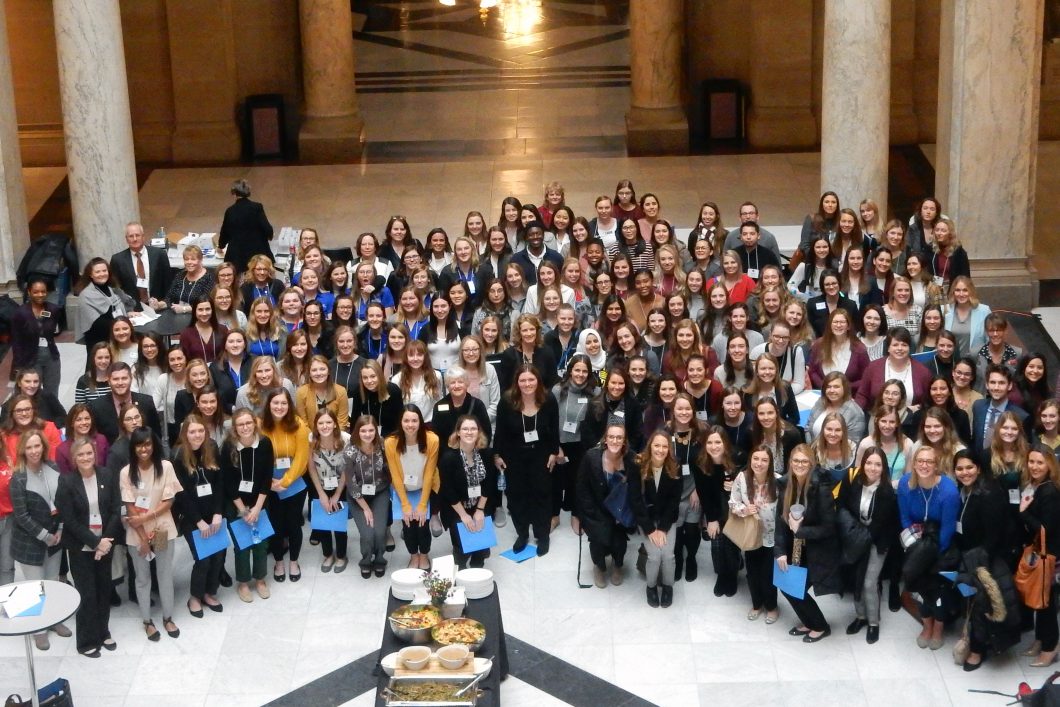In 1962, Indiana required all children with a hearing loss greater than 80dB to be institutionalized. But one mother, whose child was born with a hearing impairment, knew that with the correct tools, her child would succeed in mainstream education. She traveled an hour each way for her son to participate in the Purdue Preschool Deaf Class. Encouraged by a Purdue University professor, she collaborated with other parents to advocate for increased and improved services for children with hearing impairments. In 1971, they created the organization Hear Indiana—whose goal is to empower and support families of children who are deaf or hard of hearing.
This story has greatly impacted me because it demonstrates the power of grassroots advocacy and the importance of our participation at the university level.
With support from the Department of Speech, Language, and Hearing Sciences (SLHS) at Purdue University, one passionate group of parents laid the foundation for creation of a statewide organization, which continues to serve thousands of individuals with hearing impairment each year, 50 years later. To this day, we strive to make advocacy a way of life at Purdue.
Advocacy at Purdue University
Professor Dawn Wetzel plays a pivotal role in incorporating advocacy into the everyday lives of both students and professionals at Purdue.
Developing Advocacy Training Sessions
In 2016, with the support of an ASHA Student Advocacy Grant, Professor Wetzel organized and hosted our first student training session at the State House in collaboration with the Indiana Speech-Language-Hearing Association (ISHA). This Legislative Day provided students the opportunity to learn about the legislative body, process, and current legislation, as well as speak directly with state legislators. While initial student numbers were limited, those who attended demonstrated remarkable confidence and enthusiasm when they spoke to their legislators, and afterwards proposed additional opportunities to advocate on campus.
Establishing a Student Advocacy Council
Consequently, Professor Wetzel created the Purdue University Department of Speech, Language, and Hearing Sciences Student Advocacy Council (SAC). Comprised of approximately 12 undergraduate and graduate students, SAC’s primary role is to promote student advocacy at all CSD programs in Indiana. Through in-person visits or Skype calls with each CSD program and/or their NSSLHA chapter, SAC members:
- Tout the importance of advocating as an active ISHA member.
- Recruit students to participate in Legislative Day.
- Organize content and present information during the student training session prior to meeting with the legislators during Legislative Day.
Getting NSSLHA Involved in Purdue’s Advocacy Efforts
As a freshman, I attended a general meeting for our NSSLHA chapter. I remember listening to SAC discuss the opportunity to get involved, and the chapter president’s statement on how impactful the 2017 Legislative Day was for her. I was immediately on board!
The following year, our chapter collaborated on ways to support SAC’s advocacy efforts; and for the past two years, NSSLHA has become increasingly involved by:
- Fundraising to help offset the costs of Legislative Day (for the training breakfast, training materials, and transportation for Purdue University students).
- Creating a new NSSLHA chapter officer position—the ISHA Liaison—so we have an officer who serves as a NSSLHA liaison both to ISHA and SAC.
These combined efforts have drastically increased attendance at Legislative Day—from 44 participants in 2017 to 200+ participants the past two years! This includes students from all seven CSD programs in Indiana. Some programs are even cancelling clinic and classes to allow entire cohorts to participate.
In addition to Legislative Day, our NSSLHA chapter and SAC has also collaborated to host other advocacy events on campus throughout this past year:
- Student Advocacy Day: Students, faculty, university dignitaries, and legislators discuss groundbreaking research conducted at the SLHS labs, current advocacy issues, and future legislation affecting our professions and clients.
- Advocacy Lunch and Learn: Melanie Hudson presented, “Advocacy after Graduate School.”
- National NSSLHA’s Student Advocacy Day: In October, students staffed a table and shared information on ASHA’s legislative talking points and tips on how to share info with legislators. Our chapter members then sent out 60 Take Action letters to federal legislators.
- Advocacy Module: Our faculty work hard to incorporate current legislative issues into the curriculum with a dedicated advocacy module within our Clinical Practice in Speech-Language Pathology course.
Tips to Start Your Own Student Advocacy Council on Campus
If you’re reading this and thinking, “It’d be awesome to implement advocacy efforts like this on my campus,” let me share a few tips to get you started:
- Find a peer who’s willing to lead the charge with you. Then, identify a faculty member who’s passionate about advocacy and can mentor you through the process.
- Plant the seed. Start getting the word out about the idea and get people talking! Chat with your CSD friends and NSSLHA chapter to start.
- Hold informal advocacy sessions for students who want to learn more about advocacy. Giving them the tools to advocate may entice them to join a more formal advocacy program. At a minimum, it exposes them to the importance of advocacy in our field!
- Use ASHA’s Take Action website and circulate ASHA advocacy emails. Incorporate info into NSSLHA meeting agendas.
- Collaborate with your state association on advocacy events.
For those who think their voice is too small to make a difference . . . have you ever tried to fall asleep with a mosquito in the room? One small voice can make a huge impact!
Purdue’s advocacy efforts all started with one passionate mother who saw a need, recruited others, and facilitated the creation of a statewide organization that’s served thousands annually for half a century. Grassroots advocacy is more powerful than any paid lobbyist because you elect your legislators. You’re the expert. You can make a difference!
If not you, then who?

